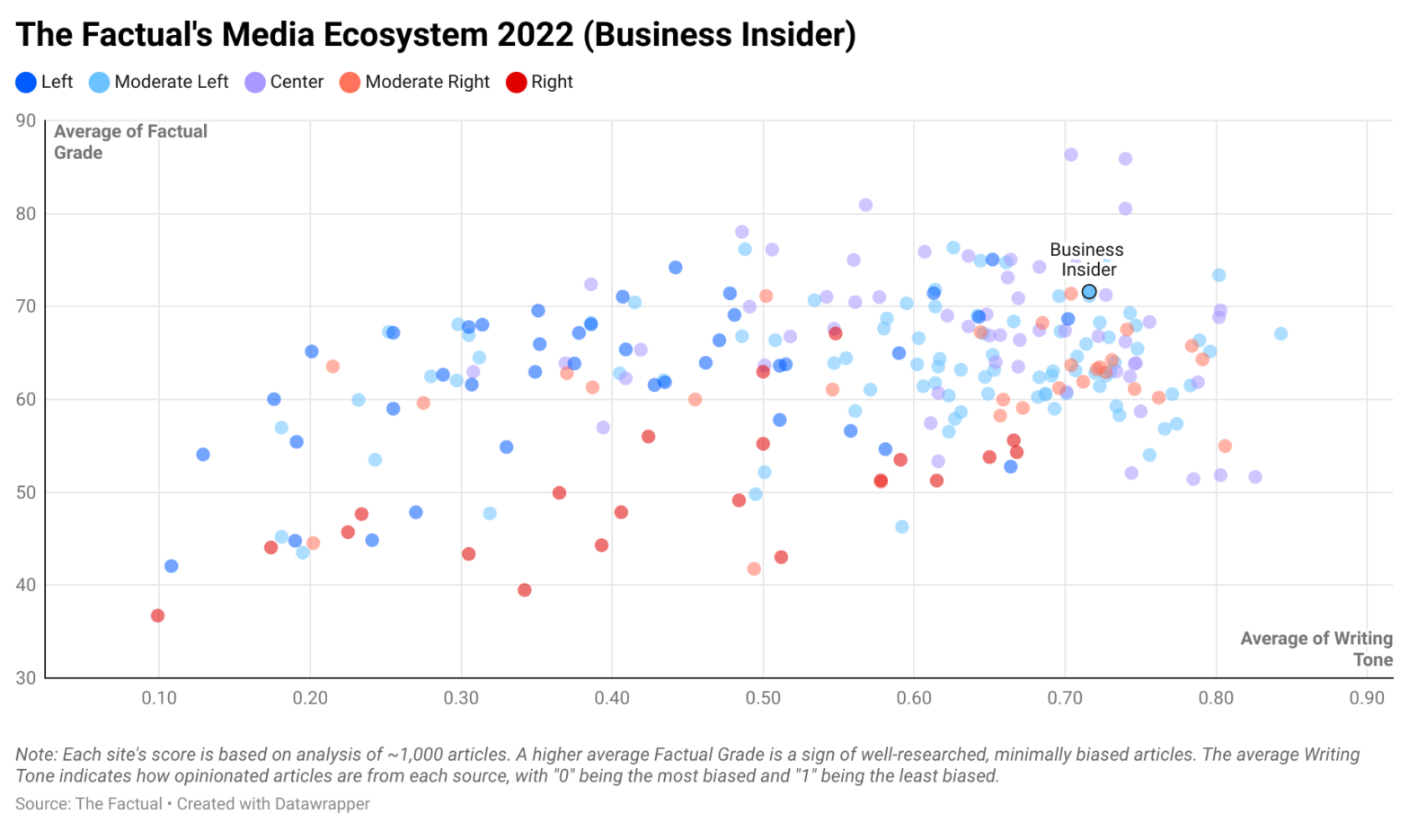Business Insider has taken the business world by storm and has become one of the largest business news sites globally. The publication has expanded its reporting to include technology, finance, media, healthcare, and strategy. Business Insider generates revenue through advertising, subscriptions, and licensing, and as a digital-native platform, it uses engaging multimedia storytelling to convey news to modern audiences. Given the site’s ascendancy, The Factual asks how factual and biased is its news coverage?
How Does The Factual Rate News Sources?
The Factual analyzes more than 10,000 news stories every day to help readers find the most informative, least-biased articles. Our news-rating algorithm scores each article along four metrics: (1) cited sources and quotes, (2) publication history, (3) writing tone, and (4) author expertise. These scores combine in a weighted average we call a Factual Grade, which ranges from 0–100%. (See our How It Works page to learn more about our algorithm.)
For this study, we analyzed ~1,000 articles each from 240 news sources. The average Factual Grade for the entire dataset was 62.5%. Based on these averages, we can compare the performance of news sites across the media ecosystem. The entire dataset can be explored in greater detail here.
How Factual Is Business Insider?
Business Insider scored an average Factual Grade of 71.6%, placing it in the 90th percentile of our dataset. In fact, the site scores in the top 25 sources that we analyzed. These high scores can be attributed to excellent souring of information. Articles almost always include numerous links to other high-quality news sources. Additionally, Business Insider has experienced journalists who routinely cover the same news beats, bringing high topical expertise and context to their reporting.
Like any news source, scores for articles from Business Insider varied widely. For example, some scored above 80%, while others scored below 60%.
Please check your email for instructions to ensure that the newsletter arrives in your inbox tomorrow.
How Opinionated Is Business Insider?
One of the metrics The Factual uses is the Writing Tone, which measures how opinionated the writing is in an article. For this metric, the algorithm looks for signs of subjective commentary (e.g., first person pronouns and unnecessary adverbs), as well as the emotional nature of selected words, and sees how prevalent they are for a given length of text. More neutral text receives higher ratings, with “0” being the most opinionated and “1” being the most neutral.
Business Insider had an average Writing Tone score of 0.72, placing it in the 78th percentile in our dataset for this metric. This suggests that articles from Business Insider are largely written in a neutral tone and focused on conveying information rather than eliciting an emotional response. This tendency can be seen in article titles such as “The FDA is reportedly set to ban Juul e-cigarettes” and “These are the 5 Democrats who voted against a ban on assault weapons in the House.”
How Biased Is Business Insider?
The Factual classifies news sites by political bias as either Left, Moderate Left, Center, Moderate Right, or Right. This classification is derived from third-party assessments from media bias organizations such as All Sides and Media Bias/Fact Check (MBFC). Based on this data, The Factual assigns Business Insider a Moderate Left classification.
AllSides ranks Business Insider as “Lean Left,” based on a blind bias survey, independent research, and 10,730 community ratings. In a survey of over 500 people, 67% rated the site as left of center. Prior to when the survey was conducted in February 2022, AllSides rated Business Insider as "Center."
MBFC classifies Business Insider as “Left-Center,” based on story selection and language in politically focused articles. However, MBFC does give the site credit for factual reporting, few failed fact checks, and well-researched and widely sourced articles. They highlight that articles tend to have slightly emotive headlines, including “The housing market just keeps getting worse for buyers. Prices haven't gone up this fast in at least 45 years” and “SpaceX offered $150K for Texas house, owner says it's a lowball offer,” but this is uncommon.
Please check your email for instructions to ensure that the newsletter arrives in your inbox tomorrow.
Who Owns Business Insider?
Axel Springer, Europe’s biggest publishing house, owns Business Insider. Axel Springer also owns a number of other large publications, including Politico (acquired in August 2021) and major German newspapers such as Die Welt and Bild. There is no evidence that this ownership structure influences the political bias of Business Insider; other publications owned by Axel Springer include both conserative-leaning (Bild) and liberal-leaning sites (Politico).
Why Does It Matter?
News articles are bound to have bias because all authors have some frame of reference within which they describe a story. Political bias ratings are helpful in understanding this framing. However, it can be more beneficial to know how factual an article is based on quantifiable metrics that can be seen across the media ecosystem, from cited evidence, to author expertise, to the writing tone. This is what The Factual ascertains.
Reading several, highly rated articles from across the political spectrum helps counter the bias of any news source or story. To have the day’s most factual news stories delivered to your inbox every morning, subscribe to our daily newsletter.
Article updated on September 15, 2022 to reflect new data.

